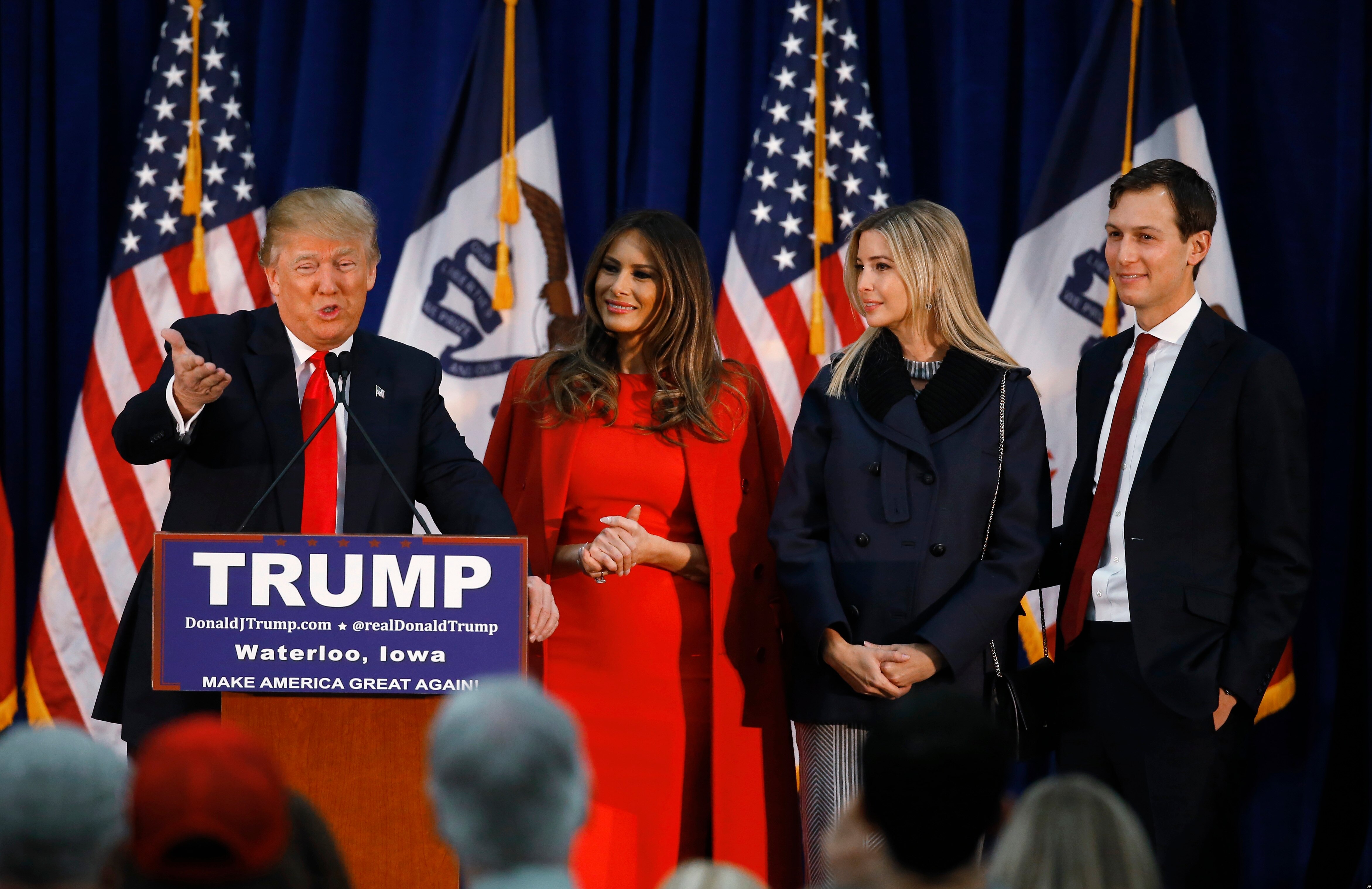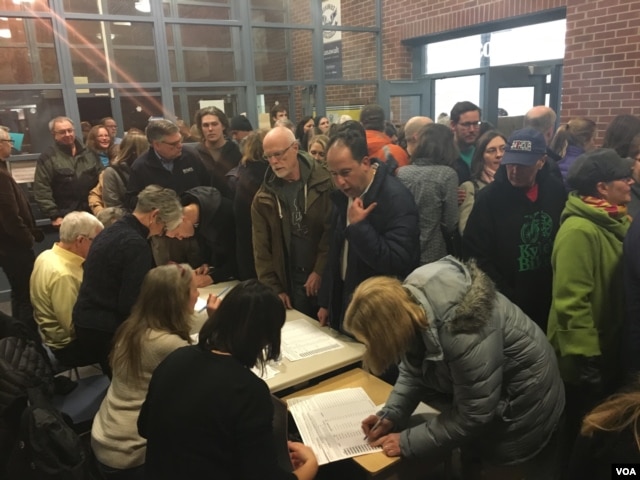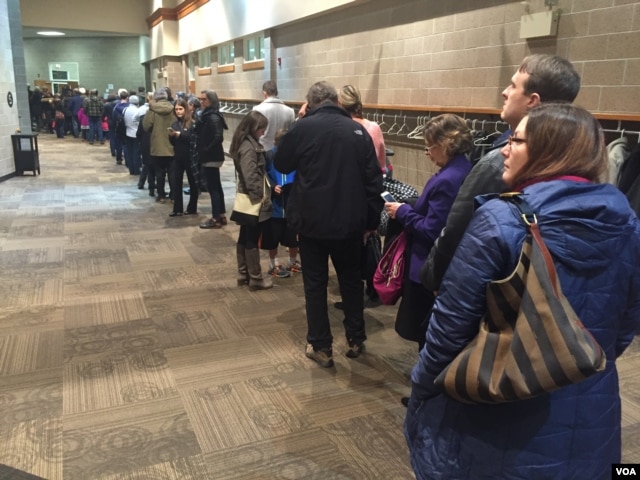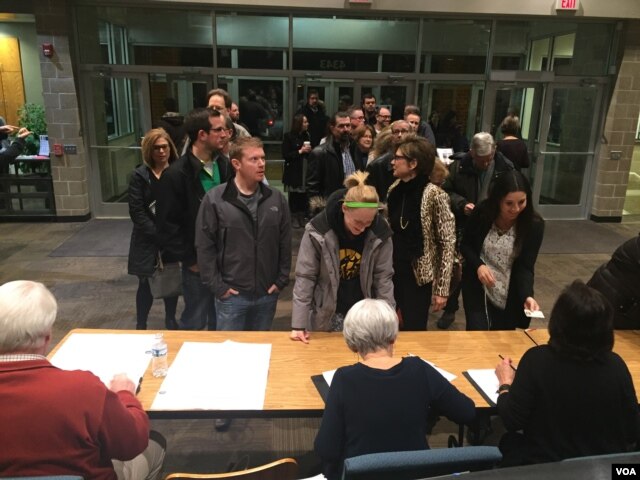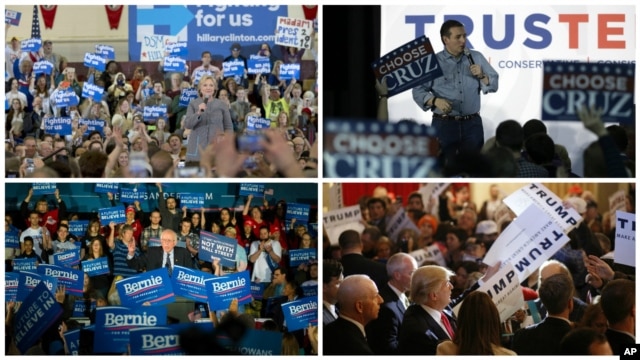Cruz Wins Iowa Republican Caucus; Democrats Clinton, Sanders in Near Tie

Senator Marco Rubio of Florida came in third with 23 percent, making him easily the leader among establishment Republican candidates.
All other GOP candidates were in the single digits.
Democratic race
On the Democratic side, former Secretary of State Hillary Clinton held a razor-thin edge, 50 percent to 49 percent, over rival Bernie Sanders, a self-described democratic socialist U.S. senator from Vermont.
 Republican presidential candidate Donald Trump, accompanied by (from second from left) wife, Melania; daughter, Ivanka; her husband, Jared Kushner; speaks during a campaign event in Waterloo, Iowa, Feb. 1, 2016.
Republican presidential candidate Donald Trump, accompanied by (from second from left) wife, Melania; daughter, Ivanka; her husband, Jared Kushner; speaks during a campaign event in Waterloo, Iowa, Feb. 1, 2016.
Former Maryland Governor Martin O’Malley, who had trouble gaining any traction in the Democratic race, planned to suspend his campaign later Monday.
Also dropping out of the presidential race is former Arkansas Governor Mike Huckabee, a Republican who won the Iowa caucus in the 2008 campaign.
The Iowa results are providing the first concrete look at voter sentiment, after a year of fierce campaigning and endless speculation.
Large crowds filled churches, gymnasiums and other public buildings across the largely rural state.
Last-minute appeals
Earlier, candidates gathered at caucus sites to make last-minute appeals.
At a hotel in Des Moines, Rubio appealed to undecided voters as he warned that the nation had reached a “turning point.”
Caucus-goers register at Hanawalt Elementary School, Des Moines, Iowa, Feb. 1, 2016. (M. Cagler/VOA)
“I believe with all my heart that if I am the nominee, I can unite this party, because if we are not united, we cannot win,” said Rubio, who is trying to attract mainstream Republicans.
At another caucus site in the capital, Trump told supporters that he was the candidate that can “bring our country back.”
“We’re in trouble, but we’re going to turn around and we’re going to make America great again,” Trump said.
Iowans began gathering at 7 p.m. local time at churches, community centers, libraries and other public buildings in nearly 1,900 precincts across the rural Midwestern state.
They discussed issues and eventually voted for their preferred candidate.
Voters express opinions
At a caucus site in Des Moines, Amelia Mohr told VOA she planned to vote for Sanders. “He is the breath of fresh air in the political process,” she said.
Democrats line up to enter into their caucus site in West Des Moines, Iowa, Feb. 1, 2016. (K. Farabaugh/VOA)
Erin Anderson, at the same location, told VOA why she supported Clinton. “Hillary’s supportive of education. I’m a teacher, so that’s really important to me.”
“Equal rights for women is very important, too, and she wants to keep health care the way it is,” Anderson added.
At a Republican caucus site, Kirby Stolen, an insurance company worker wearing a Trump button explained why she supported the real estate developer: “He has nothing to lose. Would you rather have someone threatening who would stand for the people, and be kind to us and our country?”
Iowa momentum
Iowa’s first-in-the-nation vote is seen as a crucial way for candidates to gain momentum in the U.S. primary election, which will continue to be held state-by-state until mid-June.
Republican voters get ready for their caucus, West Des Moines, Iowa, Feb. 1, 2016 (K. Farabaugh/VOA)
The goal is for candidates to win their party’s nomination by securing a majority of delegates, or party representatives, which are handed out based on the result of each state vote.
In Iowa, those delegates are rewarded proportionally rather than on a winner-takes-all basis.
That meant it was much less likely a clear winner would emerge from Iowa, said Arthur Sanders, a professor of politics at Drake University in Des Moines.
“When you have so many people running, for there to be a simple storyline is more complicated than it is when you only have three people running,” Sanders told VOA.
Narratives
Although Iowa rewards a relatively small number of delegates, the outcome here is expected to help create crucial narratives that will have a major impact on the race.
Clockwise, from top left, U.S. presidential candidates Hillary Clinton, Ted Cruz, Donald Trump and Bernie Sanders campaign in Iowa ahead of Monday’s first-in-the-nation caucuses, Jan. 31, 2016.
On the Democratic side, a Sanders win would mean the independent senator has a major advantage over Clinton heading into next week’s primary in New Hampshire, where he has a massive lead.
“If Sanders is able to win both Iowa and New Hampshire, then I think it means we’re in for a long campaign on the Democratic side,” said Arthur Sanders. “And that’s why Iowa is crucial.”
Snowstorm?
A massive snowstorm taking aim at the Hawkeye State had been seen as a major factor in determining voter participation.
But forecasters expected temperatures to not fall below freezing until after the caucus process had ended.
Kathryn Gypson and Kane Farabaugh contributed to this report.


